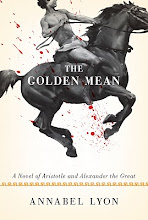 The Greek term "eudaimonia" is occasionally translated as "happiness", though a more Aristotelian understanding of the term would be "human flourishing", or a complete human life. In Upheavals of Thought: The Intelligence of Emotions, the American scholar Martha Nussbaum points out that in English the word has tended to associate the supreme good with happiness or pleasure, whereas the ancient Greek concept is "compatible with as many distinct conceptions of what that good is as one cares to propose". Further, "A conception of eudaimonia is taken to be inclusive of all to which the agent ascribes intrinsic value: if one can show someone that she has omitted something without which she would not think her life complete, then that is a sufficient argument for the addition of the item in question" (32-33).
The Greek term "eudaimonia" is occasionally translated as "happiness", though a more Aristotelian understanding of the term would be "human flourishing", or a complete human life. In Upheavals of Thought: The Intelligence of Emotions, the American scholar Martha Nussbaum points out that in English the word has tended to associate the supreme good with happiness or pleasure, whereas the ancient Greek concept is "compatible with as many distinct conceptions of what that good is as one cares to propose". Further, "A conception of eudaimonia is taken to be inclusive of all to which the agent ascribes intrinsic value: if one can show someone that she has omitted something without which she would not think her life complete, then that is a sufficient argument for the addition of the item in question" (32-33).According to Wikipedia, "A moral theory which links virtue (arete) and happiness (eudaimonia) specifying the relation between these two concepts is one of the central preoccupations of ancient ethics, and a subject of much disagreement. As a result there are many varieties of eudaimonism. Two of the most influential forms are those of Aristotle[1] and the Stoics. Aristotle takes virtue and its exercise to be the most important constituent in eudaimonia but does acknowledge the importance of external goods such as health, wealth, and beauty. By contrast, the Stoics make virtue necessary and sufficient for eudaimonia and thus deny the necessity of external goods."
This image is of Eros and Eudaimonia.

No comments:
Post a Comment